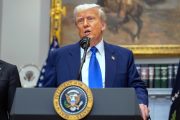
In 1984, this writer witnessed first-hand the bias of the media against Republicans. Former President Gerald Ford had come to Oklahoma to campaign for a Republican presidential candidate Jerry Smith. Obtaining media credentials in my position as editor of Oklahoma’s conservative newspaper The Oklahoma Constitution, I arrived early for the pre-event press conference.
It was an eye-opening experience. Before Ford and Smith made their appearance to the media, I listened to the Republican-bashing by the reporters. The whole atmosphere was that it was just assumed that all the reporters were against Republicans. Then next year, in 1985, I reported on the visit by President Ronald Reagan for Oklahoma’s U.S. Senator Don Nickles, who was gearing up for his 1986 re-election effort. Seated in the media area, I listened to a cacophony of carping criticism of all things Republican and/or conservative, the likes of which made the negative commentary of the local press the previous year seem tame by comparison.
After Reagan’s speech, I asked ABC’s Sam Donaldson what he thought of the talk, and he replied, his voice dripping with sarcasm, “It is a speech for the ages. It is a speech that will live.”
So, when I read the results of the latest Gallup Poll which documented that Americans, especially Republicans, have little trust in the American news media, my reaction was something along the lines of, “Why has it taken so long for the average Republican to come to this conclusion?”
According to the Gallup Poll, which was released Wednesday, only 14 percent of Republicans express trust in the media, down sharply from 32 percent only one year earlier. This is by far the lowest level of confidence among Republicans in 20 years.
Overall, 32 percent of Americans say they have trust and confidence in the mass media “to report the news fully, accurately and fairly,” down eight percentage points in one year. Not surprisingly, a slight majority of Democrats (51 percent) still express trust and confidence in the media.
This is a question that Gallup has been asking since 1972, and in 1976, 72 percent of Americans expressed trust and confidence in the American media. Of course, that was shortly after the investigations of the media into the Vietnam War, and especially, the Watergate scandal. The movie All the President’s Men hit the big screen that year — a motion picture which made it appear that two Washington Post reporters had saved the republic from the evil Nixon administration. (This illustrates that, no matter how far to the Left a Republican goes, he will still be anathema to the liberal media.)
But this confidence in the integrity of the media has eroded steadily since the 1990s.
Gallup’s analysis said this year’s precipitous drop is possibly attributable to the belief of Republicans that the “mainstream media” are “hyperfocused” on every allegedly controversial statement made by Republican nominee Donald Trump, while they have devoted very little attention to the multiple controversies involving Hillary Clinton. (You think?)
Another possibility considered was the rise of more opinion-driven media, including blogs. A cursory examination of the headlines found on Yahoo News and AOL, for example, will demonstrate that both are heavily tilted against Republicans.
During a 2011 appearance on MSNBC’s Rachel Maddow Show, Senator Rand Paul spent much of his time fending off insinuations of racism among members of the Tea Party. While Fox News is clearly more hospitable to Republicans, they demonstrate a definite bias against certain viewpoints found more among paleo-conservatives, such as a non-interventionist foreign policy.
Early in its coverage of the 2016 presidential campaign, Fox News even forgot to include Senator Paul in their presidential poll, despite the fact that Paul was registering above other candidates who were mentioned in the survey. And, of course, Sen. Paul’s father, Ron Paul, was treated even worse during his 2012 bid for the White House.
Usually, the method used by the media is more subtle. For the most part, the media slants its coverage by determining what to cover — leaving the viewer unaware of many issues and viewpoints that are not covered. For example, viewers will never hear a serious discussion on any of the networks as to why the United States should leave the United Nations, or why multilateral trade agreements threaten American national sovereignty. Their idea of a balanced report is whether the government should spend this or that amount of money on a program — not whether we should spend any money at all.
Sometimes, however, the mainstream media is openly one-sided. Who can forget the interjection by CNN’s Candy Crowley during the 2012 presidential debate between President Barack Obama and former Massachusetts Governor Mitt Romney? On October 16, 2012, the nation witnessed the spectacle of a supposedly unbiased moderator taking Obama’s side against his Republican challenger.
After the attack on the American compound in Benghazi, Libya, President Obama and several members of his administration, including Secretary of State Hillary Clinton, insisted on describing the attack as not a premeditated terrorist attack, but rather a spontaneous uprising in protest of an anti-Muslim video. At the time, Obama was enjoying the narrative that he had turned the tide against Islamic terrorism after the killing of Osama bin Laden. He did not want an attack of terrorism to shatter that belief among the American people, less than a month before a tightly-contested presidential election.
Romney is widely credited with “winning” the first debate, and had momentum. He was on the attack in the debate, pointing out that Obama and his administration were late to call the attacks terrorism. Suddenly, Crowley interjected herself into the debate, supporting Obama’s claim that he had called the attacks an act of terrorism very soon after the tragic events. Following Crowley’s statement, Romney was noticeably shaken.
It was almost as if a football official had tackled a player five yards short of the goal line, saving the game for one of the teams.
In February of 2013, Frank Fahrenkopf, the co-chair of the Commission on Presidential Debates, said Crowley was simply wrong in her assertion that Obama had called the attacks an act of terror. Of course, by that time, Obama had been sworn in for a second presidential term.
Is it any wonder that Republicans do not trust the media?




